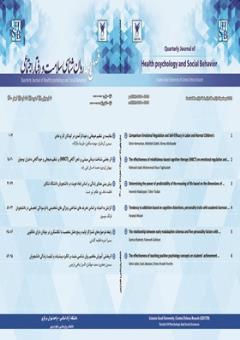The Effectiveness of Problem Solving Skills Training on Cognitive Emotion Regulation Strategies and Happiness Students
Subject Areas : Psychology
shahram vahedi
1
![]() ,
amir yekanizad
2
*
,
amir yekanizad
2
*
![]() ,
Somayeh Aalizadeh
3
,
Somayeh Aalizadeh
3
![]() ,
Nadiyeh Arjmandi
4
,
Nadiyeh Arjmandi
4
![]()
1 - professor of Tabriz university/ faculty of eduacational sciences & psychology
2 - M.A. in Psychology, Faculty of Eduactional and Humanity Sciences, Tabriz Branch, Islamic Azad University, Tabriz, Iran (Corresponding author) yekaniamir@gmail.com
3 - M.A. in Eduactional Psychology, University of Yasouj, Iran.
4 - M.A. in Eduactional Psychology, University of Sistan and Baluchestan, Iran
Keywords: problem solving skills training, cognitive emotion regulation strategies, Happiness,
Abstract :
The present study was conducted with the aim of investigating the effectiveness of problem solving skills training on cognitive emotion regulation strategies and Happiness students. The method of the present study was semi-experimental with pre-test, post-test, and control groups with 3-month follow-up periods. The statistical population consisted of all boys' secondary high school students in the academic year of 2022-2023 in the city of Khoy. The sample consisted of 40 students who were selected by multi-stage random sampling and randomly assigned to two experimental and control groups. The data collection tool was the quality of emotion regulation questionnaire (Gross and John, 2003) and Oxford happiness questionnaire (Argyle & Lu, 1989), which all subjects completed in the pre - test phase. Intervention problem solving skills training D'zurilla and coldfried (1971) was conducted for the experimental group during 10 sessions of 90 minutes, and finally, post-test and follow-up were taken from the two experimental and control groups. Data were analyzed using repeated measures variance. The results showed that problem solving skills training had a significant effect on cognitive emotion regulation strategies and Happiness students (P< 0.01). It is suggested that this program be used by custodians of education and educational institutions to design preventive educational programs and improve educational achievements.

